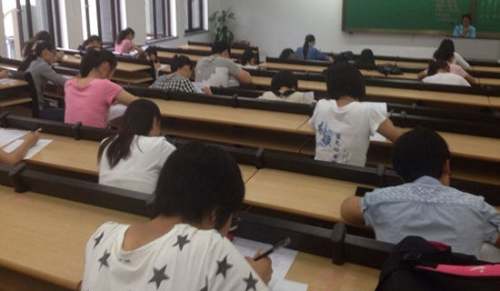奧浦諾筆試經(jīng)歷
奧浦諾筆試經(jīng)歷

while you may find that doing a straightforward math problem in the context of an interview is a bit tougher, you can see that it is just a matter of breaking the problem down. we are looking for both your ability to set the analysis up properly and then to do the math in real time.
question
q: in order to decide whether to reduce costs at the least efficient schools (i.e., those with an average cost per hire of $2,000), what else would you want to know?
a: some of the possible answers are given below.
basic questions:
· what are the components of costs at these schools (why is it so expensive to recruit there)?
· what opportunities exist to reduce costs?
· how much cost savings would result from implementing each of the opportunities?
· what consequences would implementing each of these opportunities have on recruiting at the least efficient schools?
questions demonstrating further insight:
· why is the cost lower at more efficient schools, and are there best practices in resource management that can be applied to the least efficient schools? · if we reduce costs at the least efficient schools, what will we do with the cost savings
(i.e., what would be the benefit of spending the money elsewhere vs. where it is currently being spent)?
we would not expect anyone to come up with all of these answers, but we hope some of your answers head in the same direction as ours. yours may bring some additional insights. in either case, be sure that you can clearly explain how your question will bring you closer to the
right decision.
question
the mckinsey team conducts some analysis that indicates that increasing spending on blanket advertising (e.g., advertisements/flyers on campus) does not yield any significant increase in hires.
q5: given that increased blanket advertising spending seems to be relatively ineffective, and the client doesn\''t want to increase overall costs, what might be some other ideas for increasing the candidate pool on a specific campus?
a: we are looking for at least a couple of answers like the ones given below:
· improve/enhance recruiting messages (e.g., understand target candidate group, refocus message on this group, understand competitive dynamic on campus)
· utilize referrals (e.g., faculty, alumni)
· come up with creative ways to target specific departments/clubs of the school
· rethink advertising spending - while increasing blanket ad spending doesn\''t seem to work, advertising might still be the most efficient and effective way to increase the number of candidates if it is deployed in a more systematic, targeted way
this question is a good one for demonstrating creativity because there\''s a long list of possible ideas. additional insights into how a given idea would be approached and how much it would cost are helpful.
【奧浦諾筆試經(jīng)歷】相關(guān)文章:
浦發(fā)銀行筆試經(jīng)驗(yàn)精選07-05
關(guān)于浦發(fā)銀行筆試經(jīng)驗(yàn)12-18
網(wǎng)友浦發(fā)銀行筆試經(jīng)驗(yàn)12-10
浦發(fā)銀行筆試經(jīng)驗(yàn)匯總07-31
奧飛娛樂筆試經(jīng)驗(yàn)07-13
成功通過浦發(fā)銀行筆試經(jīng)驗(yàn)12-19
面試經(jīng)歷體會(huì)及筆試經(jīng)驗(yàn)12-09
星展銀行和浦發(fā)銀行筆試題目11-06
上海奧佳筆試題面試題12-12